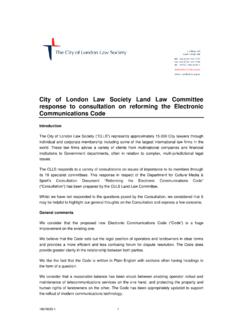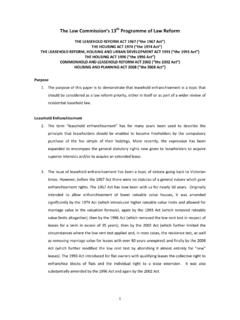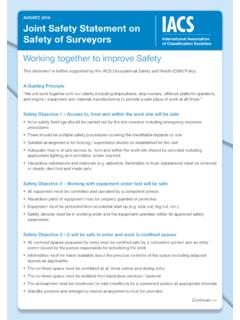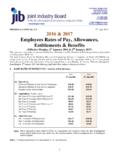Transcription of NOTE ON EXECUTION OF DOCUMENTS AT A …
1 NOTE ON EXECUTION OF DOCUMENTS AT A VIRTUAL SIGNING OR CLOSING 1. Background This note has been prepared by a joint working party of The Law Society Company Law Committee and The City of London Law Society Company Law and Financial Law Committees (the JWP). The purpose of this note is to record a (non-exhaustive) range of options available to parties when executing DOCUMENTS at 'virtual' signings or closings ( where some or all of the signatories are not physically present at the same meeting). This note is not intended to imply that virtual signings and closings cannot, or should not, be conducted in other ways. This note is simply intended to facilitate virtual signings and closings, in the light of the Mercury case. This note is relevant for virtual signings and closings of DOCUMENTS governed by English law. Each transaction should be approached according to its own facts including the countries of incorporation of the parties (and each party's domestic rules and internal procedures for EXECUTION of contracts), the content of board resolutions, whether the transaction requires individual contracts to take effect in a particular sequence, and whether a legal opinion is being issued on a given party's due EXECUTION of the DOCUMENTS .
2 In cases where particular procedures or restrictions apply to the EXECUTION or delivery of a document by a party (for example, notarisation, escrow conditions or tax considerations), care should be taken to ensure that the signing Option chosen does not conflict with those procedures or restrictions. In addition, it is important to take into account any relevant regulatory and tax implications (including in relation to stamp duty) before adopting any of the signing Options discussed in this note. 2. The Mercury Case Some of the obiter comments of the judge (Underhill J.) in this case (R (on the application of Mercury Tax Group and another) v HMRC [2008] EWHC 2721) (Mercury) have led to discussion about the effectiveness, under English law, of the use of pre-signed signatures pages and 'virtual' signings and closings where signature pages are sent/transmitted by email or fax.
3 References in this note to the use of email include the use of fax, where appropriate. In relation to deeds, the judge said (at paragraph 40 of his judgment) that "the signature and attestation must form part of the same physical document" when "it" (the deed) is signed. As a more general proposition (applicable to all contracts, whether deeds or not), the judge said (at paragraph 39): "The parties in the present case must be taken to have regarded signature as an essential element in the effectiveness of the DOCUMENTS : that is to be inferred from their form. In such a case I believe that the common understanding is that the document to be signed exists as a discrete physical entity (whether in a single version or in a series of counterparts) at the moment of requirement that a party sign an actual existing authoritative version of the contractual document gives some, albeit not total, protection against fraud or mistake".
4 The JWP has obtained detailed advice from Leading Counsel (Mark Hapgood QC) on the implications of Mercury in relation to the EXECUTION of DOCUMENTS . This note has been approved by Leading Counsel. It is the view of Leading Counsel and of the JWP that the Court of Appeal decision in Koenigsblatt v Sweet [1923] 2 Ch 314 (Koenigsblatt) remains the leading authority on the applicability of the principles of authority and ratification to the creation of legally binding written agreements, that Mercury (a first instance decision) should be viewed as limited to its particular facts and, to the extent inconsistent with Koenigsblatt (a Court of Appeal decision), the Koenigsblatt decision should prevail. 1 Even on a cautious assumption that Mercury may have wider application beyond its specific facts, the JWP considers that it is possible to demonstrate an alternative understanding and intention of the parties and/or to comply with this requirement for a "discrete physical entity/authoritative version" in cases where contracts are circulated for signature by email.
5 Examples of some appropriate procedures are summarised below; these procedures (or permutations of them) are already often followed in practice. Variations of these procedures or other procedures may also work perfectly well. This note has been developed to help parties who wish to take a cautious approach in the light of Mercury, where it is more convenient to have a virtual signing or closing. As such, the JWP has taken, as its starting point, a conservative view of the judge's comments in the case. The JWP nevertheless considers that the judge's comments in paragraphs 39 and 40 should be read narrowly, in the context of the facts of that case. 3. Relevant statutory and other legal requirements Deeds The judge in Mercury took the view that section 1(3) of the Law of Property (Miscellaneous Provisions) Act 1989 (LPMPA) requires a deed to be executed by an individual in its final version (see his remarks above).
6 Section 1(3) LPMPA provides: "An instrument is validly executed as a deed by an individual if, and only if- (a) it is signed- (i) by him in the presence of a witness who attests the signature; or (ii) at his direction and in his presence and the presence of two witnesses who each attest the signature; and (b) it is delivered as a deed by him or a person authorised to do so on his behalf". By analogy, the judge's approach could also apply in the case of EXECUTION of a deed by a company (see section 74A Law of Property Act 1925 and sections 44 and 46 Companies Act 2006 which also use the word "it" in relation to the document being executed). Whilst Leading Counsel and the JWP take a different view to that of the judge on the interpretation of section 1(3) LPMPA, it is recognised that this is a question of statutory interpretation that was not addressed in Koenigsblatt. For this reason, the JWP considers that Option 1 (described below) represents a prudent approach in relation to the EXECUTION of deeds (whether by an individual or on behalf of a company) at a virtual signing or closing.
7 However, it should be emphasised that Option 1 is not the only way to execute a valid deed at a virtual signing/closing. Real estate contracts In relation to real estate contracts, section 2 LPMPA provides: "(1) A contract for the sale or other disposition of an interest in land can only be made in writing and only by incorporating all the terms which the parties have expressly agreed in one document or, where contracts are exchanged, in each. (2) The terms may be incorporated in a document either by being set out in it or by reference to some other document. (3) The document incorporating the terms or, where contracts are exchanged, one of the DOCUMENTS incorporating them (but not necessarily the same one) must be signed by or on behalf of each party to the contract". 2 Some contracts for the sale or other disposition of an interest in land may be included in a contract that is primarily about something else, an asset sale agreement may include (i) an agreement to transfer properties, along with other assets, or (ii) an agreement to share a site temporarily, by granting a lease on closing.
8 Another example would be a mortgage, trust deed, mortgage debenture or other security document creating any security interest in real estate that might be acquired in the future. By analogy, the judge's approach in relation to section 1(3) LPMPA could apply also to section 2 LPMPA. For this reason, where it is decided to execute a real estate contract or contracts containing real estate provisions 'virtually', rather than by following the traditional methods of executing such contracts with 'wet ink' signatures, the JWP considers that the most prudent course of action is to follow Option 1 (described below). Many real estate contracts will be subject to an exchange utilising one or other of the Law Society Formulae for exchanging contracts by telephone. If this is the case, solicitors in possession of a contract other than with 'wet ink' signatures will need to make this fact clear to the other party and obtain prior approval to its use.
9 Solicitors should also take account of any need for the future availability of DOCUMENTS with 'wet ink' signatures for registration purposes (as mentioned in paragraph ), or where so agreed, and appropriate undertakings may be required, so that the DOCUMENTS with 'wet ink' signatures are available for those purposes. However, in some such cases (in particular residential conveyances) it may not be appropriate to conduct a virtual signing or closing. Guarantees Section 4 of the Statute of Frauds 1677 requires a guarantee (or a memorandum or note thereof) to be in writing and signed by or on behalf of the guarantor. Guarantees include undertakings by a party to procure that other parties ( subsidiaries) perform their obligations. Signature, for this purpose, has a relatively wide meaning. In the case of N Mehta v J Pereira Fernandes [2006] EWHC 813 (Ch) (Mehta), the judge made it clear that, even in the case of a guarantee, an email can be a sufficient "memorandum or note" of the guarantee, for purposes of section 4, as long as it shows an intention to contract (as opposed to being a mere statement of expectation), and provided the name of the guarantor appears in the e-mail, with the intention that it constitutes a signature (in fact the guarantor in that case had not put his name anywhere in the e-mail, so the guarantee was not upheld).
10 Attaching a signature page to a final approved version of a document with the specific authority of the signatory is considered to be a "signature" within the wider meaning above; it would also satisfy the test laid down in Mehta. Guarantees are sometimes executed as deeds (in which case the comments in paragraph above apply). Frequently, guarantees are also included in simple contracts ( credit agreements); in such cases, it is considered that Option 1 or Option 2 (described below) can be followed. Option 3 (the use of pre-signed signature pages) may also be available, provided that there is clear evidence ( an exchange of emails) that the signatories (or their lawyers or someone else authorised by the signatory) have authorised the attachment of their signatures to the final version of the relevant guarantee. Firms issuing legal opinions in relation to guarantees should bear in mind the distinction, in section 4, between a guarantee and a memorandum or note thereof.














